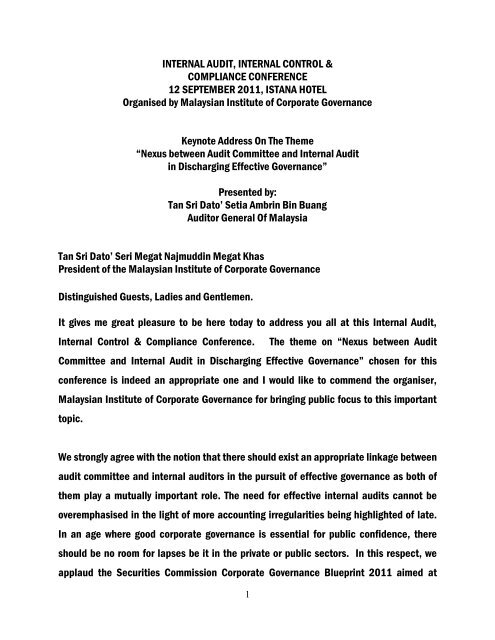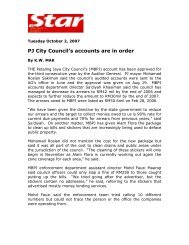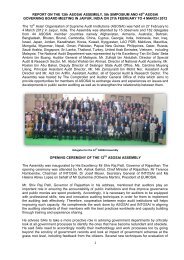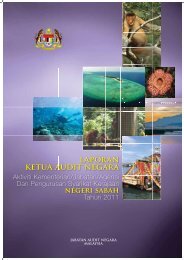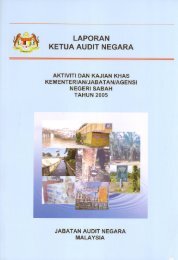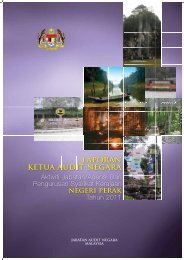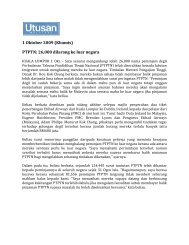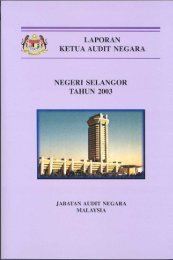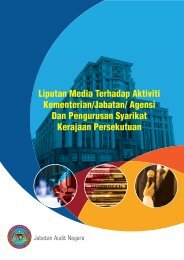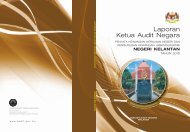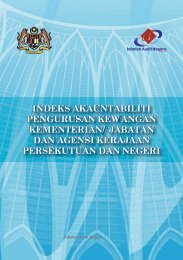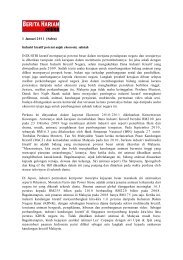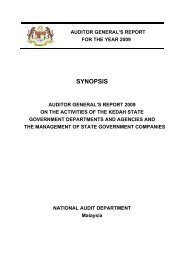Draft Speech By - Jabatan Audit Negara
Draft Speech By - Jabatan Audit Negara
Draft Speech By - Jabatan Audit Negara
- No tags were found...
Create successful ePaper yourself
Turn your PDF publications into a flip-book with our unique Google optimized e-Paper software.
INTERNAL AUDIT, INTERNAL CONTROL &COMPLIANCE CONFERENCE12 SEPTEMBER 2011, ISTANA HOTELOrganised by Malaysian Institute of Corporate GovernanceKeynote Address On The Theme“Nexus between <strong>Audit</strong> Committee and Internal <strong>Audit</strong>in Discharging Effective Governance”Presented by:Tan Sri Dato’ Setia Ambrin Bin Buang<strong>Audit</strong>or General Of MalaysiaTan Sri Dato’ Seri Megat Najmuddin Megat KhasPresident of the Malaysian Institute of Corporate GovernanceDistinguished Guests, Ladies and Gentlemen.It gives me great pleasure to be here today to address you all at this Internal <strong>Audit</strong>,Internal Control & Compliance Conference.The theme on “Nexus between <strong>Audit</strong>Committee and Internal <strong>Audit</strong> in Discharging Effective Governance” chosen for thisconference is indeed an appropriate one and I would like to commend the organiser,Malaysian Institute of Corporate Governance for bringing public focus to this importanttopic.We strongly agree with the notion that there should exist an appropriate linkage betweenaudit committee and internal auditors in the pursuit of effective governance as both ofthem play a mutually important role. The need for effective internal audits cannot beoveremphasised in the light of more accounting irregularities being highlighted of late.In an age where good corporate governance is essential for public confidence, thereshould be no room for lapses be it in the private or public sectors. In this respect, weapplaud the Securities Commission Corporate Governance Blueprint 2011 aimed at1
achieving excellence in Corporate Governance whose recommendations will beimplemented through a new Corporate Governance Code. We believe that this initiativewill further promote internalization of the culture of good governance in the corporatesector in which internal audit and audit committee do play a critical role.Quite obviously, effective governance requires both an effective audit committees andan effective internal audit in which the nexus between the two is just as importance.However, in reality are they really fulfilling their expected duties? What are thechallenges they face and how can they overcome it? How can they effectively worktogether to enhance good corporate governance? These are the questions that will beaddressed in my keynote today.Good corporate governance is still the buzzword of the corporate sector as well as thegovernment sector. The global financial crisis and the result of several fiascos likeEnron, Worldcom, Transmile and PKFZ were a wakeup call as it highlighted the laxstandards of governance in terms of a lack of proper risk management and internalcontrol mechanisms among these business entities. The values propagated ongovernance are nothing new actually as the concept was introduced maybe hundreds ofyears ago. Simply put, corporate governance is all about transparency andaccountability to all stakeholders.As we know, The Malaysian Code on Corporate Governance places a heavy responsibilityon the board of directors. Yet the board can’t be expected to implement the highstandard of governance by themselves. This is where the audit committee and auditorswho are considered to be the traditional gatekeepers often do more for corporategovernance behind the scenes than the public realizes. The responsibility of an auditcommittee in the area of corporate governance is to provide assurance and improve2
stakeholder’s confidence in the integrity of an organisation’s processes and proceduresrelating to internal control and corporate financial reporting. As for the internal audits,they are the arms and legs of the audit committee in assisting the auditing committee todischarge their responsibilities.Challenges faced by the Internal <strong>Audit</strong> in the Public SectorLet me share with you my perspective on the internal audit scenario in the public sectorwhether in the ministries, departments and statutory bodies at the federal, states andlocal government including GLCs. Based on our observations, there are variouschallenges which affect the effective functioning of internal audit within the governmentbody such as staffing, audit competency, audit performance, audit independence andattitudes and actions of departmental heads and role of the audit committee.Relatively speaking, the lack of numbers of staff was commonly listed as a majorconstraint especially among the ministries, departments and agencies at the federaland state level as well as local governments. It was revealed that some had a staffcomplement of 5 or fewer though their audit operations require more additional staffmembers. At the federal level, this issue has somehow been overcome by the newrestructuring exercise. The total number of internal auditors has currently increased to1,082 staff compared to 640 in 2008 and 641 are caderised posts from <strong>Jabatan</strong> <strong>Audit</strong><strong>Negara</strong>.Internal auditors are seen to be moving away from traditional roles of “bean counters”and “number crunchers” to roles that have seen them become involved in almost everyfacet of an organisation’s operations. They watch for efficiencies, economies andeffectiveness and make recommendations for improvement when they find gaps. They3
Changing banking for goodList of witnesses to the CommissionWednesday 12 September 2012Sir David Walker Ev 1PageWednesday 17 October 2012Paul Volcker Ev 18Monday 22 October 2012Erkki Liikanen, Chair, High-level Expert Group on structural bank reformsestablished by the European Commission, Governor of the Bank of Finlandand member of the Governing Council of the European Central Bank Ev 32Wednesday 24 October 2012Sir Donald Cruickshank Ev 42Thursday 25 October 2012Martin Wheatley, Managing Director, Consumer and Markets Business Unit,Financial Services Authority Ev 53Monday 29 October 2012Professor John Kay, Visiting Professor of Economics, London School ofEconomics, and Fellow of St John’s College, Oxford Ev 66Wednesday 31 October 2012Martin Taylor, Chairman of Syngenta and former member of theIndependent Commission on Banking Ev 78
The Federal Treasury has issued a circular governing the tasks and responsibilities ofinternal auditing in 2004. In addition, guidelines on how internal auditing should beconducted has also been issued on 31 st March 2011. In the public sector, there is somuch for the internal auditors to cover despite the staff constraints, therefore in certaincases, the independence of internal auditors seems to have been compromised by thembeing required to perform the organisation’s operational tasks alongside their internalaudit duties, for example replying the audit observations and doing ad hoc jobs. As aresult, the quality of auditing is affected and it is not surprising therefore that what littleaudit they could conduct is just confined to the financial control assessment instead ofmitigating potential fraud cases. We have to admit that the public sector too is notimmune to irregularities in spending public money for instance, false claims of workdone, non delivery of services, misuse of funds, manipulation of ICT system andmisappropriation of money etc. Therefore, it is imperative that internal audit shouldfunction as they ought to, given the constraints that they are facing.The value of internal auditor to the Heads of ministries, departments and agencies is toassist them in preventing irregularities from happening. It is important for Heads of theMinistries/Departments/Agencies to ensure that internal audit reports are really beingfollowed up through concrete actions. Heads of the organisations especially at theStates and Local Government must ensure that internal audit units are staffed withqualified and experienced personnel in order to discharge their responsibilitieseffectively.With regard to of the <strong>Audit</strong> Committee, its existence is vital to help the Head ofministry/department/agency or Chief Executive Officer meet their statutory andfiduciary responsibilities. The audit committee in the ministry, department and agency at5
the Federal and State level is established quite recently through the 2009 Ministry ofFinance Circular whilst the audit committee in Federal Statutory Bodies has been inexistence since 1998 when it was made mandatory to the organisations. Theeffectiveness of these audit committee depends a lot on its leadership on thecomposition of the audit committee, the frequency of meetings and the agenda itself,which should focus on current issues raised by both external and internal auditors.Role of the <strong>Audit</strong> CommitteeThe primary responsibilities of the audit committee are assisting themanagement/board of directors in carrying out the responsibilities relating to theorganisation’s accounting policies, internal control and financial reporting practices.The audit committee should establish and maintain lines of communication between themanagement/board and the external auditors as well as the internal auditors. The auditcommittee expects the internal auditors to examine and evaluate the adequacy andeffectiveness of the internal control system and the quality of performance in carryingout assigned responsibilities. Internal auditing may be used as a source of informationon major frauds or irregularities as well as the organisation compliance with laws andregulations.I believe that most of the audit committees in the public sector, chaired by the SecretaryGeneral or the DG as stipulated in the Government circular do a very good job. However,there is always room for improvements. Some may feel that this arrangement mightimpair the independence of the committee and limit the transparency of fair reporting byinternal auditors. The independent nature of the audit committee is required as it willresult in the internal auditors assuming a greater responsibility in the financial reportingprocess. However it is appropriate that the Secretary General or the DG, as controlling6
officers, should know cases of irregularities or non-compliance and to direct appropriatecorrective or remedial action. The commitment of the Secretary General/DirectorGeneral who provides the nexus between internal audit and audit committee toward theeffective functioning of these two mechanisms is therefore very vital for goodgovernance in the organization. In terms of the composition of the audit committee, it isimportant that the members be comprised of multi skilled non-executive directors suchas accountants, lawyers, entrepreneurs and members with political experience who canenhance the effectiveness of the audit committee function. This is particularly relevantfor many GLCs. In most cases, we observe that the audit committee members have amodest background and experiences in accounting, auditing and related subjects.Our recent findings on the performance evaluation study on actions taken by ministrieson the <strong>Audit</strong>or General’s report showed several shortcomings such as audit observationsare not presented to the <strong>Audit</strong> Committee, delay of presenting the audit observations tothe <strong>Audit</strong> Committee between I to 5 months and the <strong>Audit</strong> Committee reports are notpresented to the Financial Management and Account Committee. It is the duty of Headsof internal audit to inform the audit committee on a timely basis the results of audits,highlighting significant audit findings and recommendations. It is necessary for theaudit committee to comply with the Ministry of Finance Circular on the submission of thecommittee report to the Financial Management and Account CommitteeEnhancing the Relationship between <strong>Audit</strong> Committee and Internal <strong>Audit</strong>orsI believe that a good working relationship should exist between the audit committee andinternal auditors so that they can help each other to fulfill their responsibilities to themanagement/board of directors, shareholders and other outside parties. Since the rolesof the Heads of ministries/departments/agencies or CEOs have shifted from oversightof compliance to broader oversight of strategic and operational, the audit committee7
and internal auditors must work together and reposition themselves to help with newthreats and opportunities and of course, having the knowledge and skill sets to analysethem.The internal auditors must ensure that the audit committee receives regular reports oninternal audits continuous improvement programme and quality targets to ensure fullvisibility. The internal auditors should involve the audit committee with the developmentof the internal audit mission, objectives, strategies and focus. On the other hand, theaudit committee should approve and periodically review the internal audit charter aswell as the staffing plans and financial budgets.The internal auditors can assist the audit committee with educational and advisoryactivities on the topic of governance and risk management by conducting trainingprogramme for the audit committee or identifying external training programme whereboth internal auditors and audit committee members can participate together.ConclusionIn conclusion, the government is working conscientiously to promote high standards anddeliver excellence in financial management and governance throughout the private andpublic services. In respect of this, both the audit committee and internal audits plays acritical role in delivering the organisation’s strategic objectives and championing bestpractice in governance. The culture of good governance must be continuously infused inpublic or private organizations towards meeting their strategic objectives, as well ascontributing to attaining the national objective of becoming a developed and highincome nations. Internal controls must be seen to be effective all the time and this canbe better served by an effective nexus between an effective audit committee and anaffective internal audit.Once again, I thank you for your kind invitation and I wish all of you a successfulconference.8


